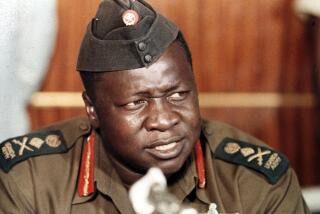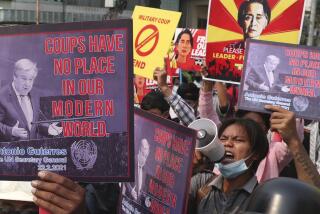Ugandan Rebel Leader Proclaims New Regime
- Share via
NAIROBI, Kenya — The commander of the Ugandan rebel army said Sunday that he has replaced the six-month-old ruling military council with one of his own and promised to form a broad-based government in Uganda and punish criminals from previous regimes.
Yoweri Museveni outlined his plans during a speech on the government-owned radio a day after his National Resistance Army captured the capital, Kampala, and sent thousands of government soldiers fleeing.
Deserting army troops were robbing and beating civilians and looting as they retreated, said a group of evacuees who reached Nairobi late Sunday afternoon from northern Uganda.
The Radio Uganda broadcast, monitored in Nairobi, was the first time since midday Friday that the radio had been on the air and the first formal announcement to Ugandans that Kampala had fallen to the National Resistance Army. Telephone and telex connections to the outside were cut on Saturday.
Meets With Envoys
Earlier Sunday, Museveni met with U.S. Ambassador Robert Houdek, British High Commissioner Colin MacLean and a representative of the European Communities, a spokesman at the British High Commission (embassy) in Nairobi said. The four discussed the evacuation of foreigners and restoration of electric, water and telephone services in the city, the British spokesman said.
In Washington, the State Department said a chartered aircraft will take some embassy personnel and American citizens out of Kampala on Tuesday or Wednesday.
The State Department had no details on how many people were leaving, but it said there were about 170 Americans in Uganda, 21 of them attached to the embassy. All Americans in Kampala were safe, but were advised to stay indoors, the State Department said.
The British, too, were planning to evacuate some of their personnel and citizens but did not have an exact number, the high commissioner said.
The first group of evacuees out of Uganda--seven employees of the U.N. World Food Program and three workers of the Lutheran World Foundation--arrived aboard a crowded Cessna 560 from Moroto, 218 miles north of Kampala.
The 10--two Irishmen, two Kenyans, three Ghanaians, a Filipino, a Bangladeshi and an Ethiopian--asked to be evacuated by air after they found themselves cut off by road and in the path of marauding army deserters.
They said some fleeing soldiers were being massacred by soldiers from rival tribes.
Appeals for Calm
Museveni appealed for calm in his radio broadcast and said he would appoint nonpartisan village committees to handle local affairs in areas controlled by the National Resistance Army. He also promised to form a broad-based, civilian administration “in the shortest time possible.”
“Uganda has been messed up by incompetent and politically bankrupt leaders for the last 24 years,” Museveni said. “Their main interests have been sectarianism, corruption and subservience to foreign interests.”
Since gaining independence from Britain in 1962, Uganda’s 14 million people have seen leaders deposed three times by coups--Milton Obote twice and dictator Idi Amin once.
Museveni, a former Ugandan defense minister, began an insurgency in 1981 against the government of civilian President Obote, charging him with rigging the election that brought him to power in the wake of the overthrow of Amin in 1979. Amin had seized power from Obote in a 1971 coup.
When army officers overthrew Obote last July and formed a military council with Gen. Tito Okello as its chairman, four insurgency groups joined the new government.
But the National Resistance Army refused to cooperate. It took control of the southwestern third of Uganda and periodically issued threats to march on Kampala.
Last month, the government and the National Resistance Army signed a peace and power-sharing agreement in Nairobi, but neither side observed all of its terms, and Museveni declined to go to Kampala to take up his post under the accord. Fighting resumed, culminating in Saturday’s takeover of Kampala by the insurgents.
The Uganda army had 18,000 men, according to the London-based International Institute for Strategic Studies.
The National Resistance Army has never released figures on its size, but Museveni is thought to command 9,000 men who in general are better trained, disciplined and organized than the government army.
The thousands of government soldiers fleeing Kampala headed north toward Sudan and east toward Kenya.
More to Read
Sign up for Essential California
The most important California stories and recommendations in your inbox every morning.
You may occasionally receive promotional content from the Los Angeles Times.










